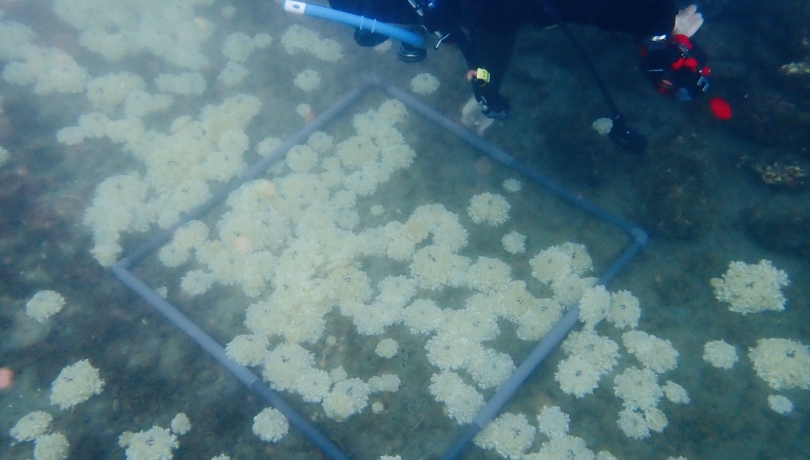The discovery, the westernmost documentation of the species in the Mediterranean, was made possible by the collaboration between researchers from the ICM-CSIC and the Aquatours Almería diving center through the Observadores del Mar platform.

A study recently published in the journal Environmental Management has confirmed the first record of the tropical jellyfish Cassiopea andromeda in the waters of Almería, representing the westernmost finding of this species in the Mediterranean Sea. The work, led by researchers from the Institut de Ciències del Mar (ICM-CSIC), was made possible thanks to the collaboration of the Aquatours Almería diving center through the marine citizen science platform Observadores del Mar (Sea Watchers), which promotes active participation of society in the study and conservation of the marine environment.
Native to the Indo-Pacific and the Red Sea, Cassiopea andromeda —popularly known as the “upside-down jellyfish” due to its peculiar habit of resting on the seabed with its tentacles facing upwards— is an exotic species in the Mediterranean, where its presence has been expanding since the late 19th century, favored by rising temperatures and the opening of the Suez Canal. In this new location in the western Mediterranean, the species has shown clear signs of establishment, suggesting it may be adapting to the environmental conditions of the Almería coast.
The discovery occurred thanks to an initial alert from local divers, who reported their observations through the "Jellyfish Alert" project on the Observadores del Mar platform. Based on these notifications, the ICM-CSIC team coordinated continuous monitoring in collaboration with the Aquatours Almería center, which documented the jellyfish’s presence in the Aguadulce area for 15 months. During this period, 12 biological samples were collected and genetically analyzed to confirm the species’ identity.
The study results show that the population of C. andromeda observed in Almería could be a stable settlement in the area. Observations over more than a year revealed the continuous presence of individuals of different sizes, suggesting reproduction and population growth processes.
"The involvement of the diving center was key to detecting and tracking the evolution of this species in the area, demonstrating how collaboration between the scientific community and citizens can provide valuable data for marine research," highlights Macarena Marambio (ICM-CSIC), first author of the article.
For their part, Aquatours Almería, which has participated in the Observadores del Mar Platform as a Sentinel Observatory since 2016, emphasizes the importance of direct observation and the diving sector's commitment to marine conservation:
“Diving centres, by exploring the same environments daily, can detect changes in ecosystems and contribute to citizen science. Furthermore, we are aware that our commitment to observing, recording, and sharing this data is key to preventing and managing potential environmental issues along the coastline.”
The finding of C. andromeda in Almería expands knowledge about the expansion of tropical species in the Mediterranean. It highlights the effects of climate change on the distribution of marine organisms. According to the study, the recording of this species so far west confirms that environmental conditions in the western Mediterranean are becoming increasingly favorable for species of tropical origin, which poses new challenges for managing marine biodiversity.
In addition to its scientific relevance, this work exemplifies the value of citizen science as a tool for the early detection of invasive species. The Observadores del Mar platform, promoted by the ICM-CSIC with the collaboration of research centers, associations, and local entities, allows for the generation of high-quality scientific data through the active participation of society. In the words of the research team, "without the collaboration of local divers, this finding would have gone unnoticed."